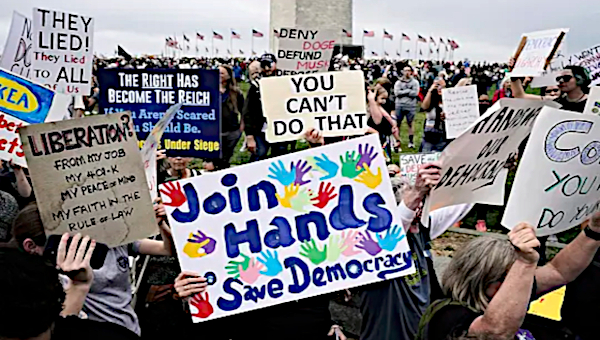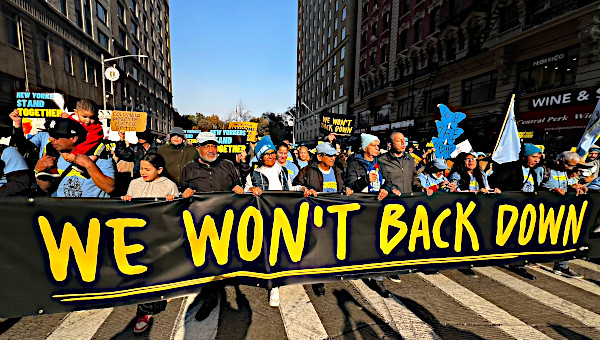Trump and the Holding Environment
There are certainly a number of highly political and socioeconomic insights about the Trump catastrophe, and here I offer some psychoanalytic ideas about [US President-elect] Donald Trump and his hold on some of the public. The psychological term “holding environment” refers to the provision of safety and security provided in earliest life. It is often depicted as holding with loving hands as in the Sistine Chapel with God just about touching Adam’s finger or Mary gently holding the baby Jesus. A crucial distinction is that some people interpret this as a time when the mothering person absorbs the baby into her own body boundaries and responds perfectly to all the baby’s needs and feelings, the baby as emperor.
Alternatively, there is the reality of differentiation and individuation from the beginning of life: “the one thing you can’t do is to be the other person,”1 vs the one-person narcissism as will be described in Trump.
What will be elaborated here is the profound destructiveness and deceptiveness of this narcissism, redolent with feelings of omniscience, omnipotence, grandiosity, wishful self-idealization. One representation of the “holding environment” is that God holds everyone in his hands – a song that became a kind of American Anthem in the 1950s on a national television show “He’s got the whole wide world in his hands.” By way of contrast is Leonard Peltier’s view that we are all “ordinary” people, that our purpose is to try to be useful.
Child soldier Ishmael Beah writes eloquently about how his grandmother’s words about the moon provided a holding environment for this tormented and tortured child soldier from Sierra Leone, a holding environment that he could keep within himself while his world was terrifying.2

Extreme, Unprecedented Danger
Where do realistic and rational feelings of security and safety come from? Now is a time of extreme, unprecedented danger as documented by James Hansen’s work on climate change, Daniel Ellsberg’s work on nuclear weapons, Stephen Hawking’s work on artificial intelligence. All these have a time frame, tipping points that cannot be reversed or controlled by human intervention. Freud outlined characteristics of rational thinking that can fluctuate in life and that matures with experience.
Rational thinking consists of being able to differentiate human and non-human, human and inanimate. It involves having a rational sense of time not shaped by wishes and fears, and a rational sense of cause-and-effect relationships. Rationality involves being able to be aware of contradictions and being able to bear the tensions of keeping this in mind – the Trumpians do not experience this kind of tension but are comfortable with opposites, rejecting inner conflict. Rational people as they mature have the capacity to be concerned about others, are able to bear anxiety and difficult feelings like depression.
Trump, like God, is the saviour and destroyer. The Abrahamic god is brutal, sadistic, vicious. God orders Abraham to kill his son as a sign of devotion and love of God, transforming infanticide into an act of love and disavowing his own murderous wishes. The Christian God abandons his own son, Jesus, as he cries out for God’s help on the cross. Willing infanticide is also found in the Greek foundational myths, such as Agamemnon killing his daughter Iphigenia to save Athens in the Trojan War. In the 1970s, child psychoanalysts and legal experts wrote a three-volume series on the best interests of the child, exploring the state’s collusion and participation in child murder and neglect. Now, brutality toward children is glaringly evident in Israel’s horrific targeting of children, in children starving worldwide, and children in detention, tortured in prisons.
Narcissists and Their Followers
The German writer Thomas Mann’s Mario and the Magician is a nauseating story about a hypnotist’s totalitarian control over his audience in which people utterly comply with his humiliating, sadistic, physically impossible directives and are unable to disobey no matter how hard they try.3 How to understand this? One possible explanation is that following orders is an identification with the narcissist, allowing them also to be as narcissistic and to gratify all their own wishes. One interpretation of US President Richard Nixon’s landslide victory after Watergate when Nixon’s criminality was obvious was that the voters then felt it was okay to also be dishonest.
Is this applicable to Trump-land? What do people know and not know about Trump and the world-at-large? This was investigated after WWII to explore what people could have known about the Holocaust.4 Consider the song lyrics of Bob Dylan’s Ballad of a Thin Man: “There’s something happening here and you don’t know what it is, do you, Mr. Jones?” This speaks to people feeling terrified while not knowing why, of separating the feeling from the cause of the feeling. For example, many people are terrified by the influx of migrants and therefore back Biden’s and Trump’s closed border policies. They do not think that climate change is fueling mass displacement and migration and support increases in carbon emissions to keep fuel prices down. Do people not know about climate disasters, burning towns and forests, unprecedented storms, and sea-level rise?

There is a wonderful children’s book that combines a rational holding environment and morality. Sendak’s Where the Wild Things Are has little Max giving up all the pleasure and power of being king of the wild things to return to his own home and warm dinner. In the Little Bear books, the mother does the reality testing by telling Little Bear that he cannot fly to the Moon or marry the princess because he is really a little bear who cannot fly. However, she reminds him that he does not have to make his own birthday cake because she always remembers his birthday. One of the best and most sensitive stories is about Frances the Badger who struggles with herself about whether to eat the delicious chocolate chompo bar she bought for her sister’s birthday – she holds onto the chocolate and squeezes it lovingly but then decides to give the whole thing to her sister. Amartya Sen describes how children can go beyond a morality of equality and empathically consider individual needs and experiences as they decide how to share a flute.
The maturational process of developing a morality is stunted in Trump-land, stuck at the earliest stage of vengeance, of eye-for-an-eye revenge such as in Israel’s October 7 retaliation. Gone are developments in understanding violence or attending to motives and underlying causes and extenuating circumstances. Officially, torture is now justifiable when it purportedly prevents more violence.
Trump’s granddaughter Mary Trump writes of the moral dishonesty rooted in the Trump patriarchy, the admonition to cheat, deceive, bully in order to achieve the American dream. Clinicians working with delinquents often found this in the family background5; the Rockefeller patriarch was a snake-oil-salesman who instructed his children how to fool people. Joe Biden has just pardoned his son Hunter for wrongdoing while he himself seems to think nothing about causing death and starvation and incarceration to millions of children.
Many testimonies of Holocaust survivors described the psychological capacity to sense real human beings in the other, to have a capacity to be concerned about others that did not have to do with any moral codes or religious doctrines or prescriptions – but really with an emotional sense of the realness of other people. This did not have to do with loving or hating others but simply with a basic human sense, to surpass narcissism. The consequences of narcissism at this time cannot be underestimated; they are terrifying. •
Endnotes
- Clare Winnicott. “Fear of Breakdown: A Clinical Example.” International Journal of Psychoanalysis 61: 351-357.
- Ishmael Beah. A Long Way Gone
- Thomas Mann. Mario and the Magician. Stories of Three Decades, the Modern Library, New York, 1930. Also see Leo Rangell. The Mind of Watergate, An Exploration of the Compromise of Integrity, Barnes and Noble, 1980.
- Laub, D. & Auerhahn, N. C. (1993) “Knowing and not Knowing Massive Psychic Trauma: Forms of Traumatic Memory.” International Journal of Psychoanalysis 74: 287-302.
- Szurek, S. A. (1961) Adelaide McFadyen Johnson – 1905-1960. Psychoanalytic Quarterly 30:84-85. Superego Lacunae.





